Review of the RWTH Science Night “5 to 12”
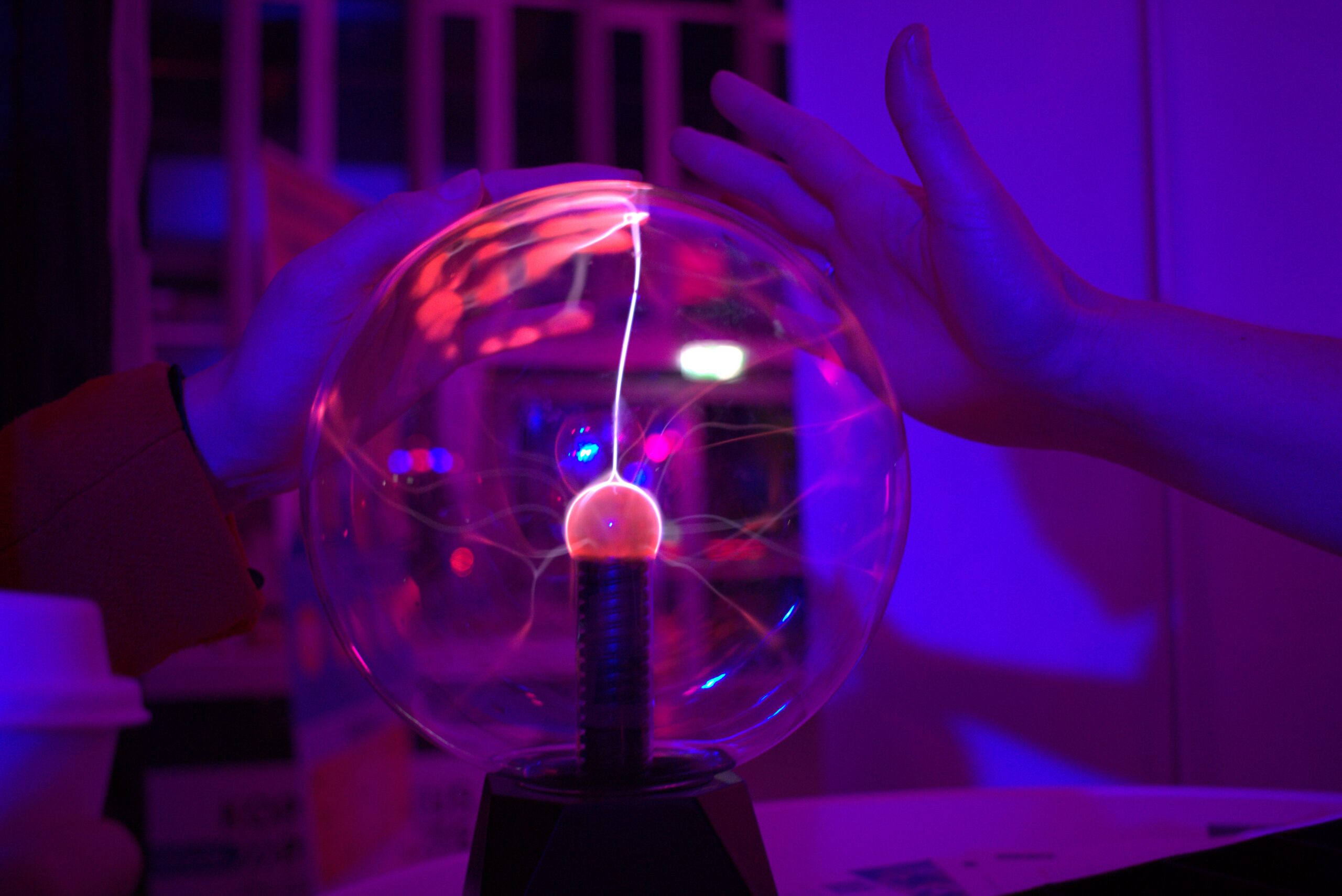
Plasma sphere with characteristic glow due to impulse stimulation © Katharina Uhlig
A look behind the scenes at the university for the 19th time: Visitors of all ages experienced the world of research from an impressive close-up.
On November 10, 2023, RWTH Aachen University opened the doors of its lecture hall center C.A.R.L. from 7 p.m. to midnight to encourage guests of all ages to get involved in the spirit of science, live out their curiosity and be inspired. What began as a modest idea over 19 years ago has developed into a mega-event that not only attracts thousands of guests, but also delights the participating and presenting university members in equal measure.
“It started out unspectacularly with around 500 visitors,” recalls project manager Thomas von Salzen from the Department of Press and Communication at RWTH Aachen University.
The idea of presenting science at an unusual time, entertaining and free of charge for all who are interested, preceded the event. The concept has since been successfully developed so that it now offers an extensive program in which researchers from numerous disciplines passionately participate. True to the motto “from the labs to the people”, the Science Night represents a unique platform that enables the direct transfer of knowledge in a social and cultural context. The focus is on the joy of experiencing research and progress together and in this way makes a valuable contribution to strengthening the links between science and society.
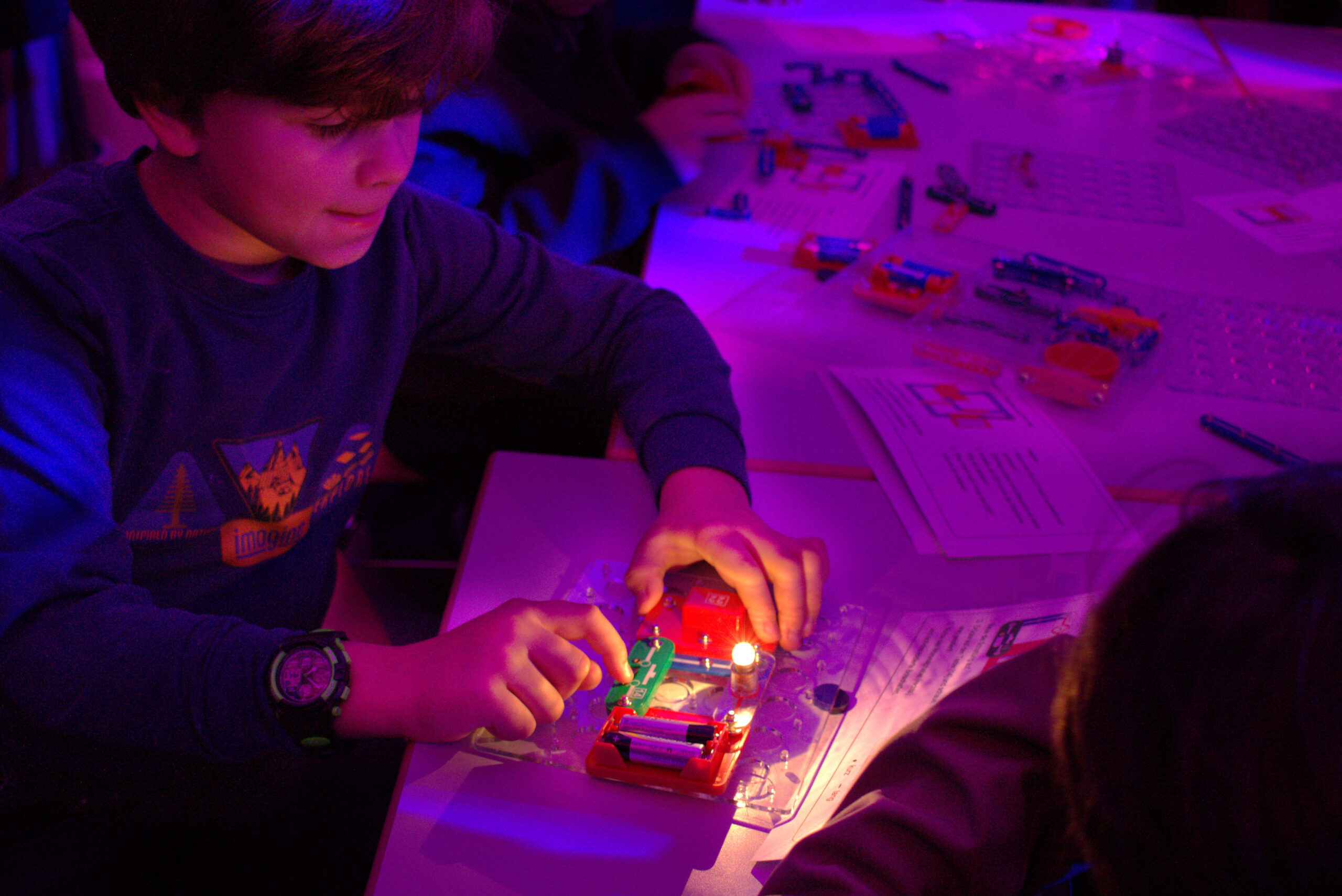
Children put together circuits themselves and thus recreate various experiments © Katharina Uhlig
The annual event is also a special highlight for the Faculty of Electrical Engineering and Information Technology. Faculty members shared their own enthusiasm for their department with the youngest guests at the Science Night. Numerous children settled down at their station with the construction kits and playfully put together electric circuits or explored the question of magnetism in the case of a rally. Also impressive was a plasma ball on display, which invited visitors to explore this fascinating phenomenon.
” Supporting the children in this was my personal highlight. Between all the light effects, the children’s eyes shone the brightest,” concludes Katharina Uhlig from the team of public relations of the deanery.
This year’s Science Night program was particularly focused on the topics of energy, artificial intelligence and mathematics. In addition, various fields of research were presented in their usual manner: impressive and comprehensible in the form of lectures, breathtaking experiments and eye-catching exhibits. In total, the program included around 30 lectures and 60 exhibits from research and teaching.
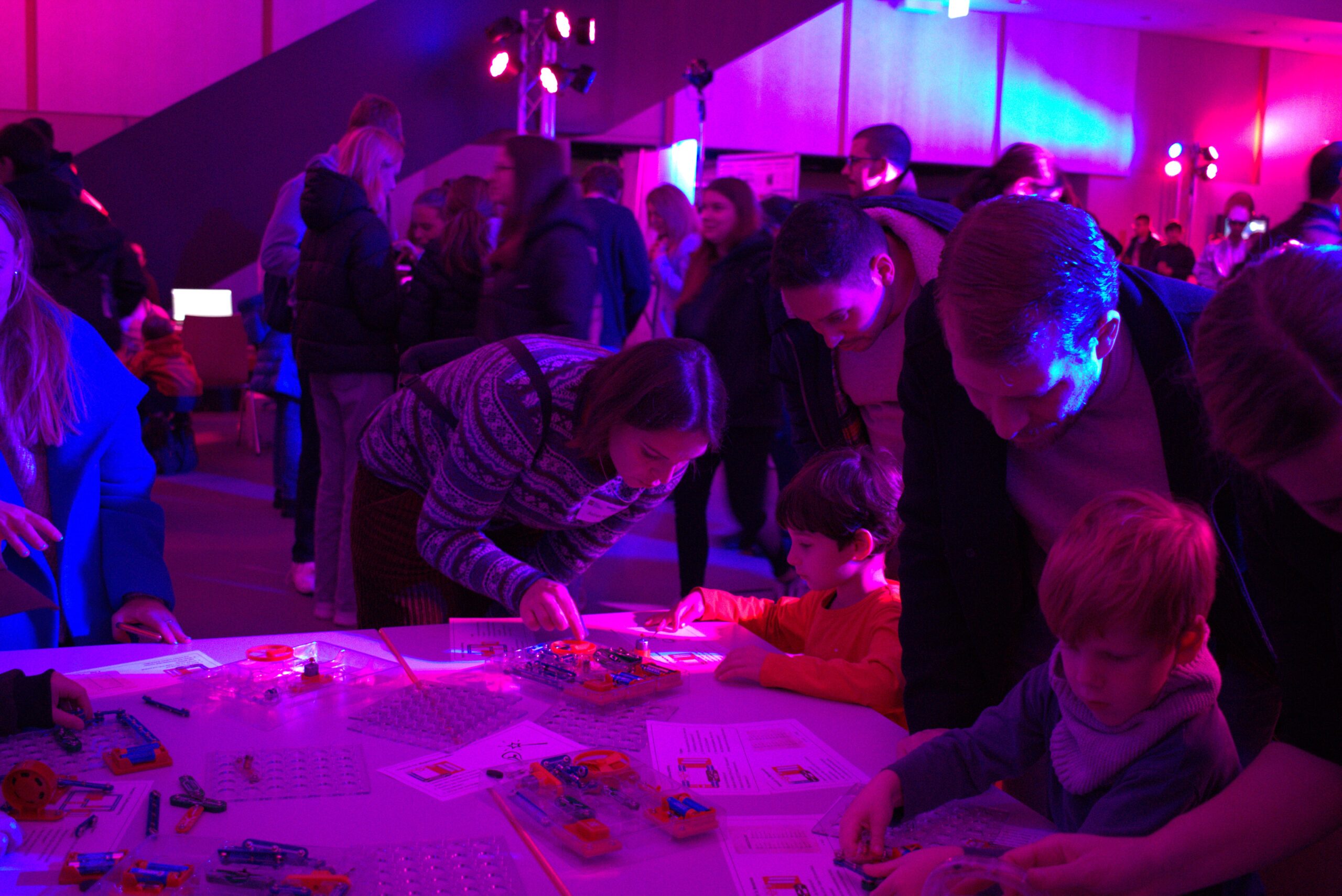
Station of the Faculty of Electrical Engineering and Information Technology, equipped with electronics construction kits © Katharina Uhlig
Young and older guests experienced special moments on the journey of discovery through “The fascinating world of science and technology”, which extended through Eric Siemes’ “Colorful experiment show”.
The show “Making music with light – experiencing music-synchronized laser shows” by the Chair of Optical Systems Technology and MHL²-Laser&Lights also left a lasting impression. Here, laser light images “danced” amazingly synchronized to the music through the room; while the guests in the immediate vicinity “literally had their hair standing on end”. There they took part in an interactive high-voltage show by the physics department.
The traditional physics fair also once again showcased all kinds of physical phenomena and invited visitors to try out many experiments for themselves.
Finally, the annual RWTH Science Slam in the main lecture hall of the Audimax was once again attended by numerous guests: Several science slammers competed against each other in an entertaining “contest of knowledge”.
Further information on the program, as well as impressions and experiences of both the organizers – Department of Press and Communication, Division 3.2 – and the participants can be accessed via the links.
Otto Junker Prize Award 2023
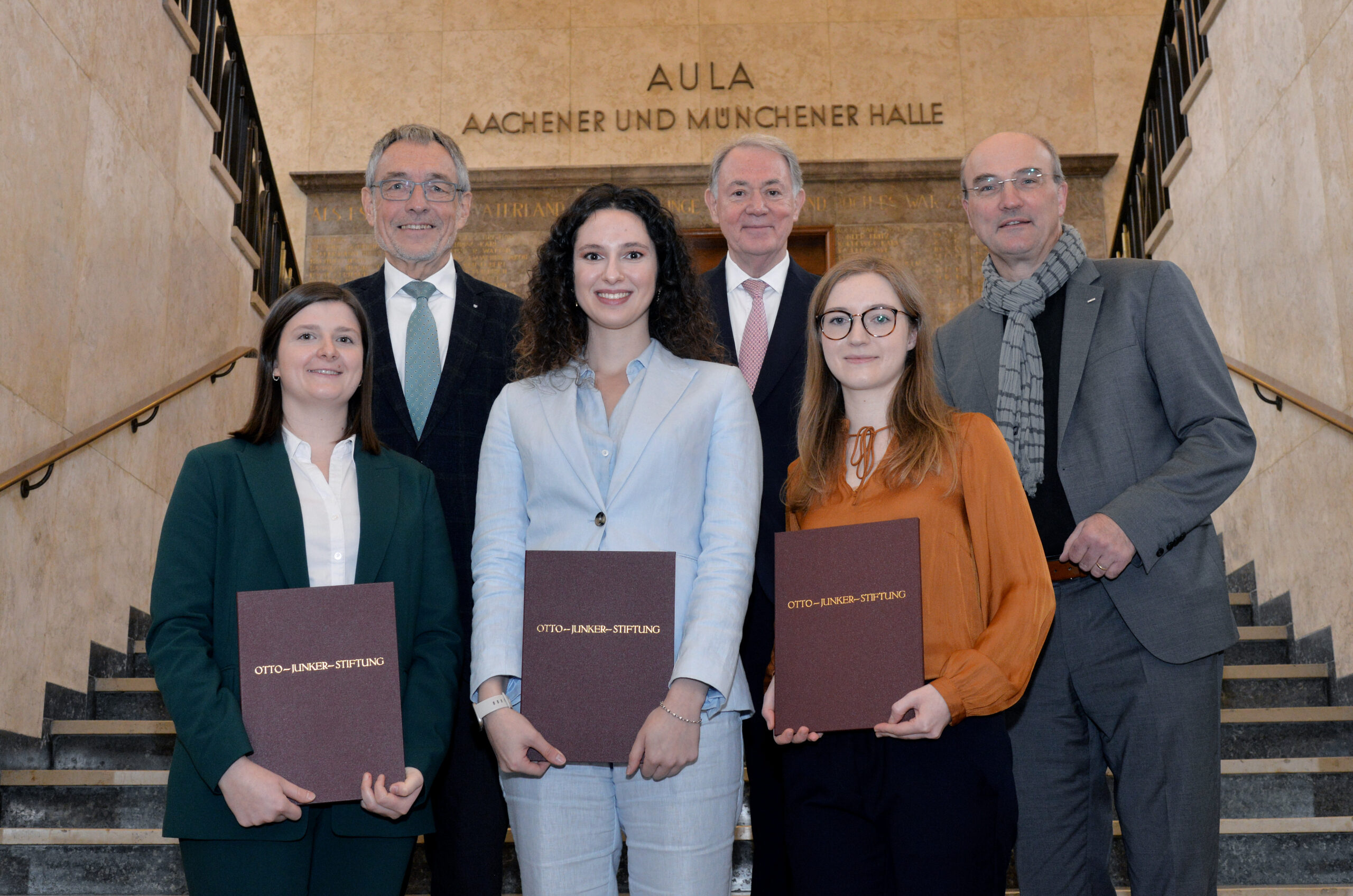
In front, from left: Prizewinners Lina Fischer, Alba Clemente Sánchez and Kathrina Theisen. At the back, from left: Wolfgang Bleck, Udo von Berg and Ulrich Rüdiger.
Lina Fischer, a doctoral student at the Chair of Transmission Networks and Energy Economics at the IAEW, is one of three winners of the Otto Junker Prize for excellent academic performance.
The Otto Junker Prizes were recently awarded to three impressive graduates of RWTH Aachen University in a festive ceremony. Lina Fischer, Alba Clemente Sánchez and Kathrina Theisen were honored for their outstanding academic achievements.
The awards, named after the founder of the Otto Junker Foundation, Dr. Otto Junker, are presented annually to exceptional graduates of the Faculty of Electrical Engineering and Information Technology and the Materials Science and Engineering Group in the Faculty of Georesources and Materials Engineering. The foundation, established in 1970, is dedicated to promoting young scientists and supports numerous individual projects.
The award ceremony took place during a festive event at which Udo vom Berg, Chairman of the Otto Junker Foundation, and RWTH Rector Ulrich Rüdiger personally presented the awards. Professor emeritus Wolfgang Bleck, Chairman of the Foundation’s Scientific Advisory Board, joined in the congratulations.
Lina Fischer, born in Bruchsal in 1998, enrolled for a Bachelor’s degree in Industrial Engineering and Management with a specialization in Electrical Power Engineering at RWTH Aachen University after graduating from high school. She completed her Master’s degree with a thesis on “The impact of flexible consumers on market pricing in a renewable electricity supply system” at the Chair of Transmission Networks and Energy Economics under the supervision of Professor Albert Moser. Since the beginning of 2023, Fischer has been working on his doctorate at the RWTH Institute for Electrical Systems and Grids, Digitization and Energy Economics.
Alba Clemente Sánchez impressed the jury with her master’s thesis on the development of a digital twin for the optimization and online control of a continuous steel casting process. Kathrina Theisen was honored for her master’s thesis entitled: “Design investigations for glass tank simulation”.
The impressive achievements of these three graduates not only underline their individual excellence, but also honor RWTH Aachen University as an educational institution for brilliant personalities. We congratulate Lina Fischer, Alba Clemente Sánchez and Kathrina Theisen on this well-deserved recognition and wish them continued success on their promising career paths.
Delegation visits IIT Madras
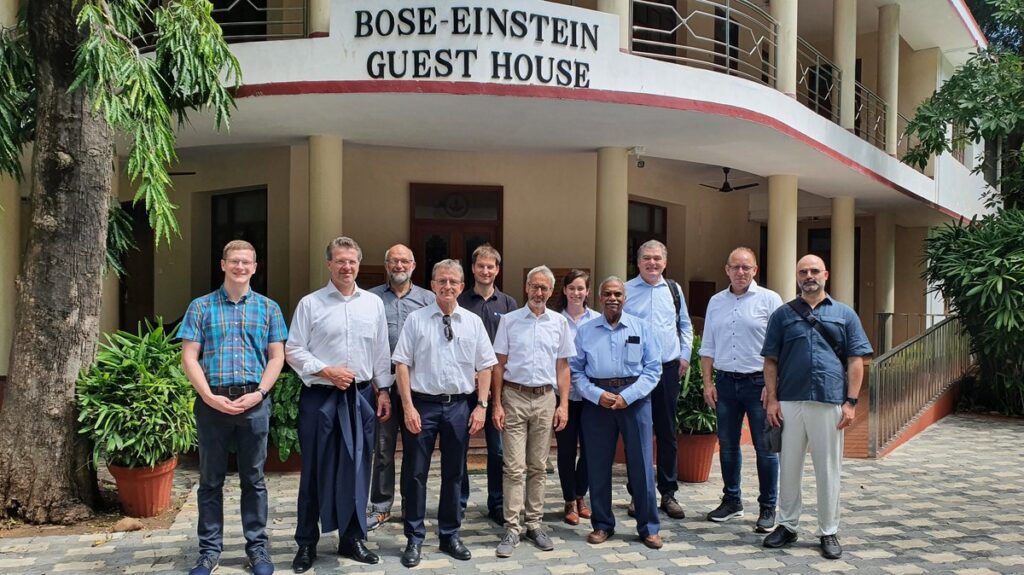
Professor Leonhardt and colleagues © MedIT
The Institute of Medical Information Technology (MedIT) on the road in Chennai, India.
Professor Leonhardt and his colleagues from MedIT and other RWTH institutes visited India in late September, specifically the Indian Institute of Technology (IIT) Madras in Chennai. The aim of this visit was to finalise the proposal for an Indo-German Graduate College.
IIT Madras is a premier university for engineering sciences in India, established in 1959 with assistance from the former West German government. The plans for this were arranged in 1956 during a meeting between Jawaharlal Nehru and Konrad Adenauer. The IIT Madras campus spans 2.5 sq km and has a dense forest. Previously, it belonged to the Guindy National Park. Conservation measures are in place for the campus where most students and staff also reside. A variety of wildlife, such as deer, antelope, axi deer, monkeys, snakes, and scorpions, can be found inhabiting the area.
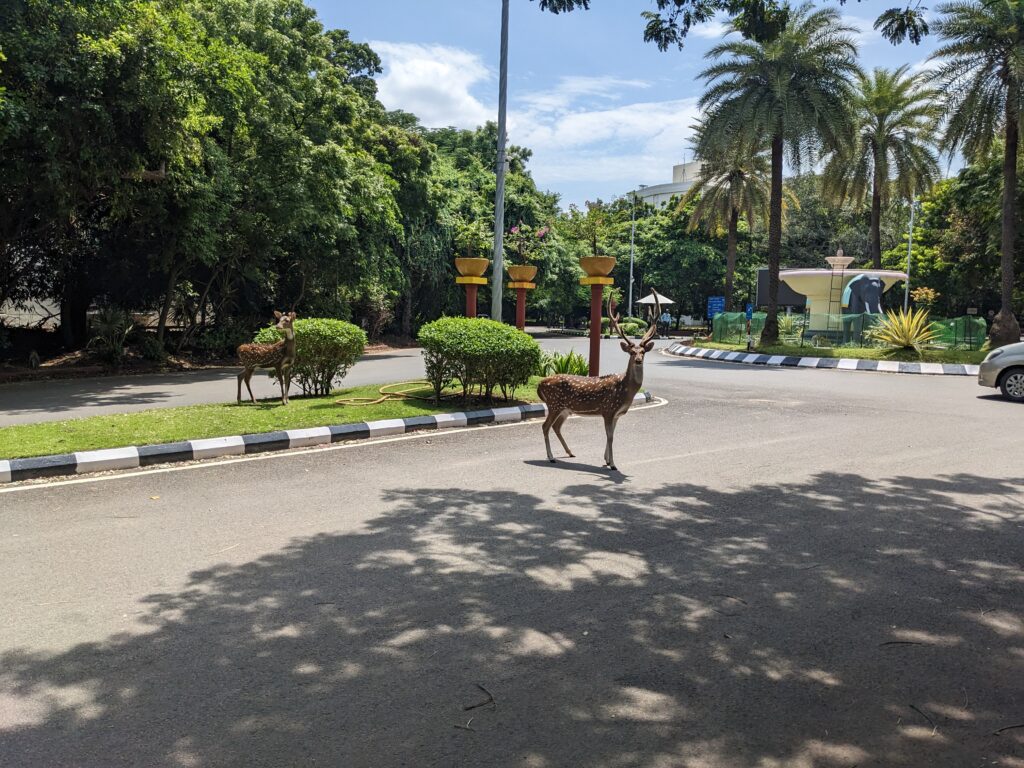
© MedIT
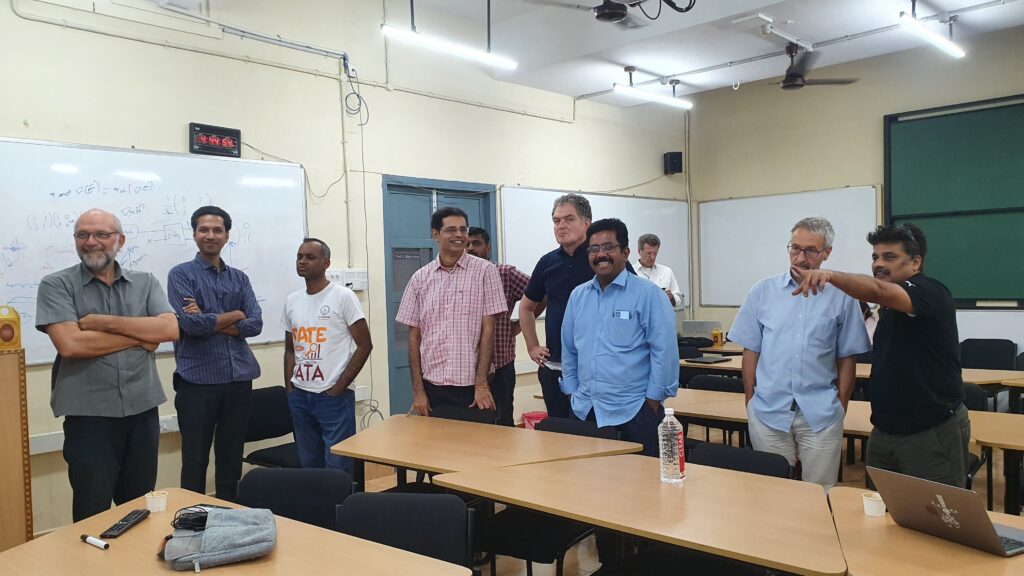
© MedIT
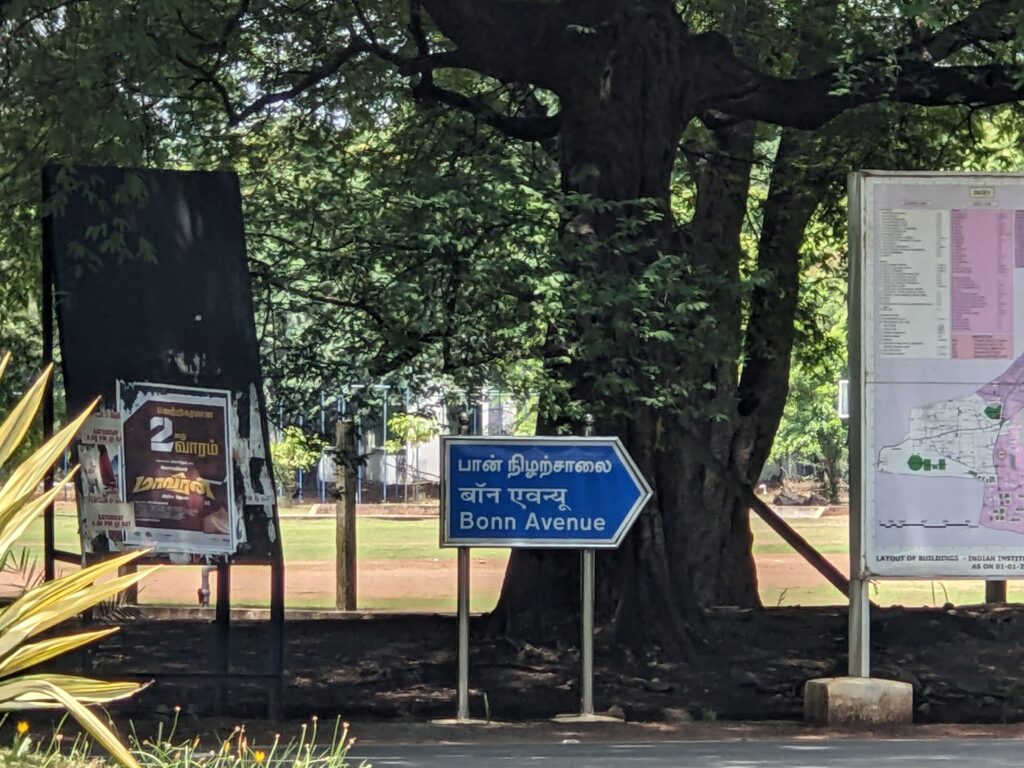
© MedIT
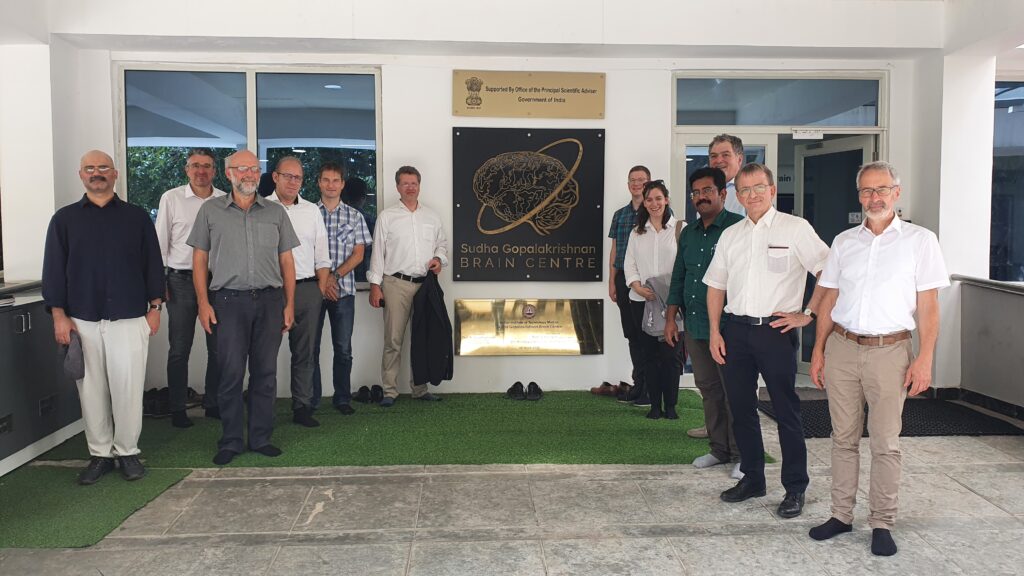
© MedIT
For more news, visit the MedIT website.
“Accure” and “Cylib” win the NRW Innovation Award 2023
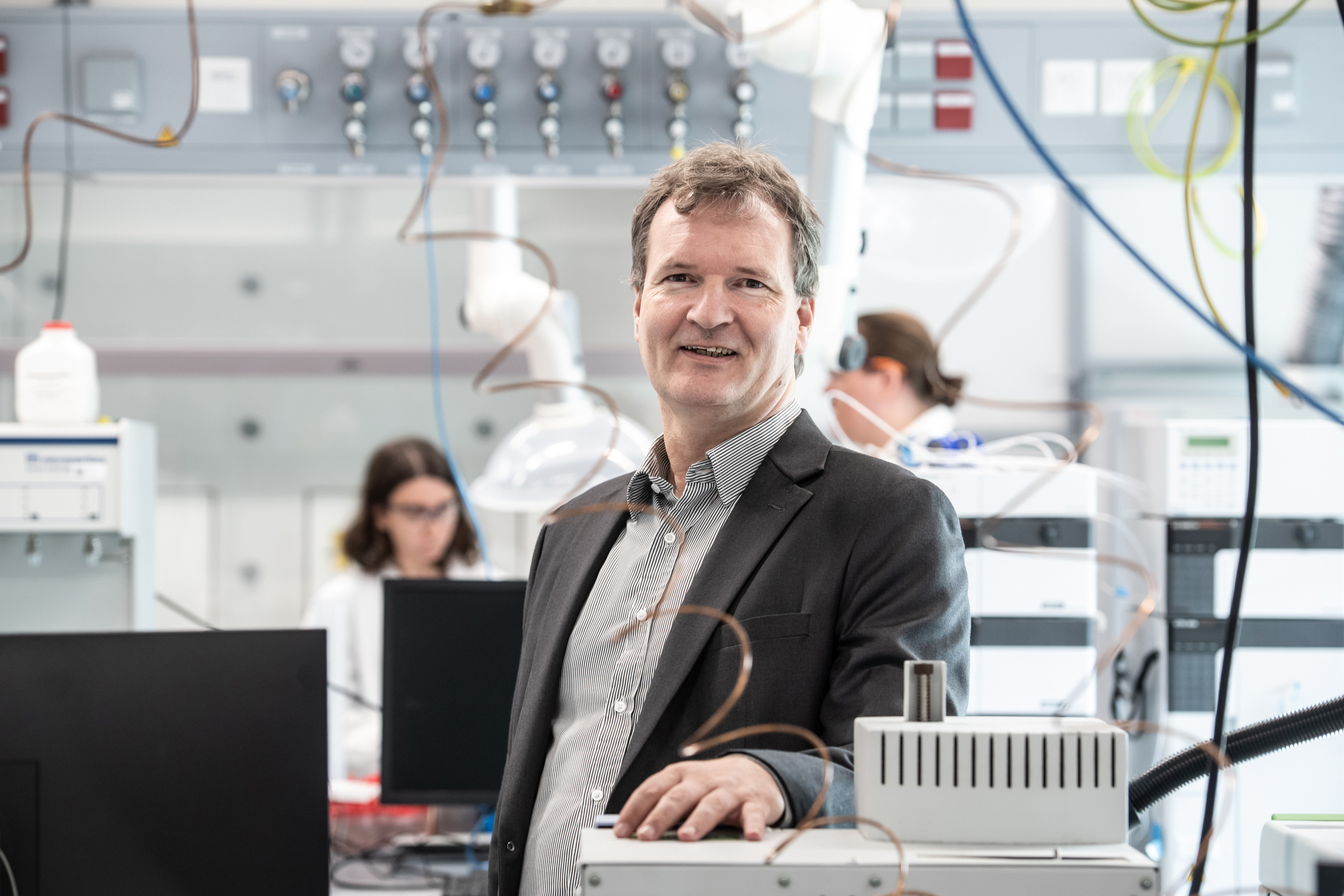
Professor Dirk Uwe Sauer © Heike Lachmann
Innovative technologies and sustainable solutions in focus: RWTH start-ups make their mark in the fight against climate change.
The NRW 2023 Innovation Award has put the spotlight on two outstanding RWTH spin-offs: “Accure” and “Cylib”. These two start-ups not only have their roots at RWTH Aachen University, but also share a common mission – to fight rising temperatures and the associated challenges of climate change.
“Accure” was founded in 2020 by Dr. Kai-Philipp Kairies, Dr. Georg Angenendt and Dr. Johannes Palmerist and emerged from the Chair of Electrochemical Energy Conversion and Storage Systems Technology headed by Professor Dirk Uwe Sauer. Dirk Uwe Sauer and co-founder Kai-Philipp Kairies accepted the NRW 2023 Innovation Award in the “innovation2business” category in Düsseldorf. This award recognizes individuals who have developed successful business models from outstanding ideas.
The start-up specializes in monitoring the performance, safety and lifetime of batteries based on big data and the use of artificial intelligence (AI). Such an innovative approach is crucial for the introduction of sustainable energy storage solutions. Dirk Uwe Sauer emphasizes the need to transfer scientific findings to the business world in order to have a positive impact on society. This is exactly what “Accure” has successfully achieved.
“This honor means a lot to us,” says Sauer, “because we are standing up for changing things with our research.”
The award in the “innovation2business” category comes with prize money of 50,000 euros, which will be earmarked for further research purposes.
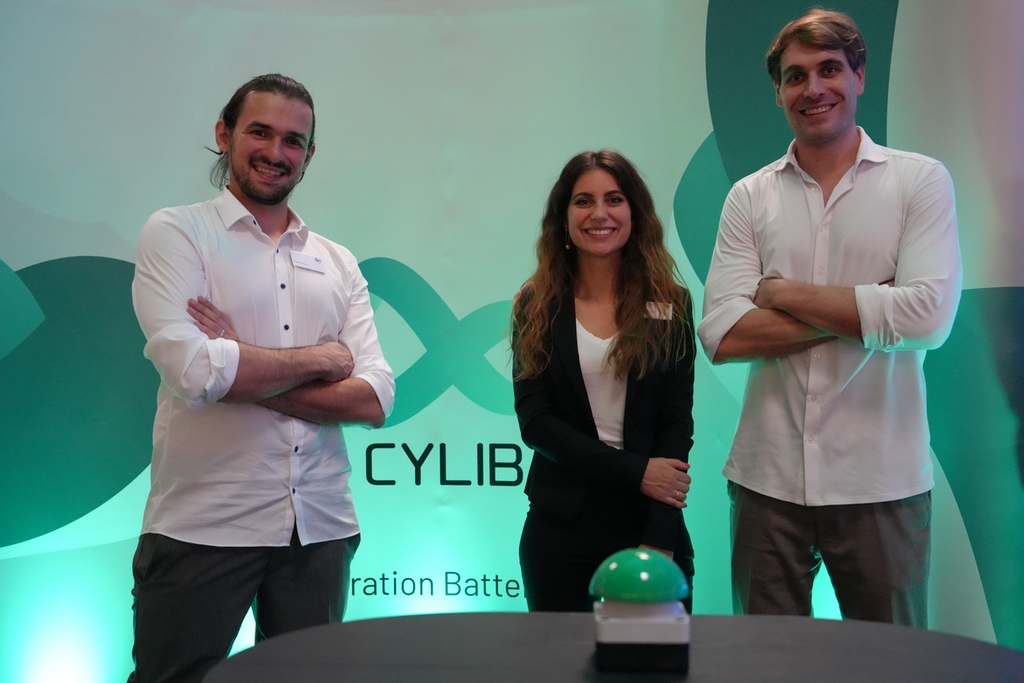
The founders of “Cylib”, Paul Sabarny, Lilian Schwich, Dr. Gideon Schwich from left © Anna Wawra
The evening was even more exciting than for “Accure” for Lilian Schwich, one of the three founders of “Cylib”. While “Accure” had already been determined as the award winner before the event, Lilian Schwich had to compete against two other nominees in the “innovation4transformation” category on Monday evening.
The start-up, which she founded together with her husband Dr. Gideon Schwich and Paul Sabarny, has spent years developing a process at RWTH Aachen University to recycle all the components of a lithium-ion battery. The goal is to recover all components and thus close the gap in the circular economy. This approach is not only more effective, but also more environmentally friendly compared to the current state of the art.
“The award is also a recognition for the long hard time of research,” said Lilian Schwich, “with research we spent many hours, days, weeks, weekends.”
The audience award “innovation4transformation” is given to personalities whose innovative products, solutions or business models contribute in an outstanding way to solving transformation challenges. This category is endowed with 25,000 euros and recognizes the contribution of “Cylib” to the circular economy and environmental protection.
Both awards underscore the important role of RWTH spin-offs in developing innovative solutions to the pressing challenges of the 21st century, particularly in the fight against climate change. With their groundbreaking technologies and sustainable approaches, they are pioneers on the path to a more environmentally friendly and sustainable society.
For more insights, watch the interview and video with Professor Dirk Uwe Sauer and the interview with Lilian Schwich.
ITG Conference on Speech Communication
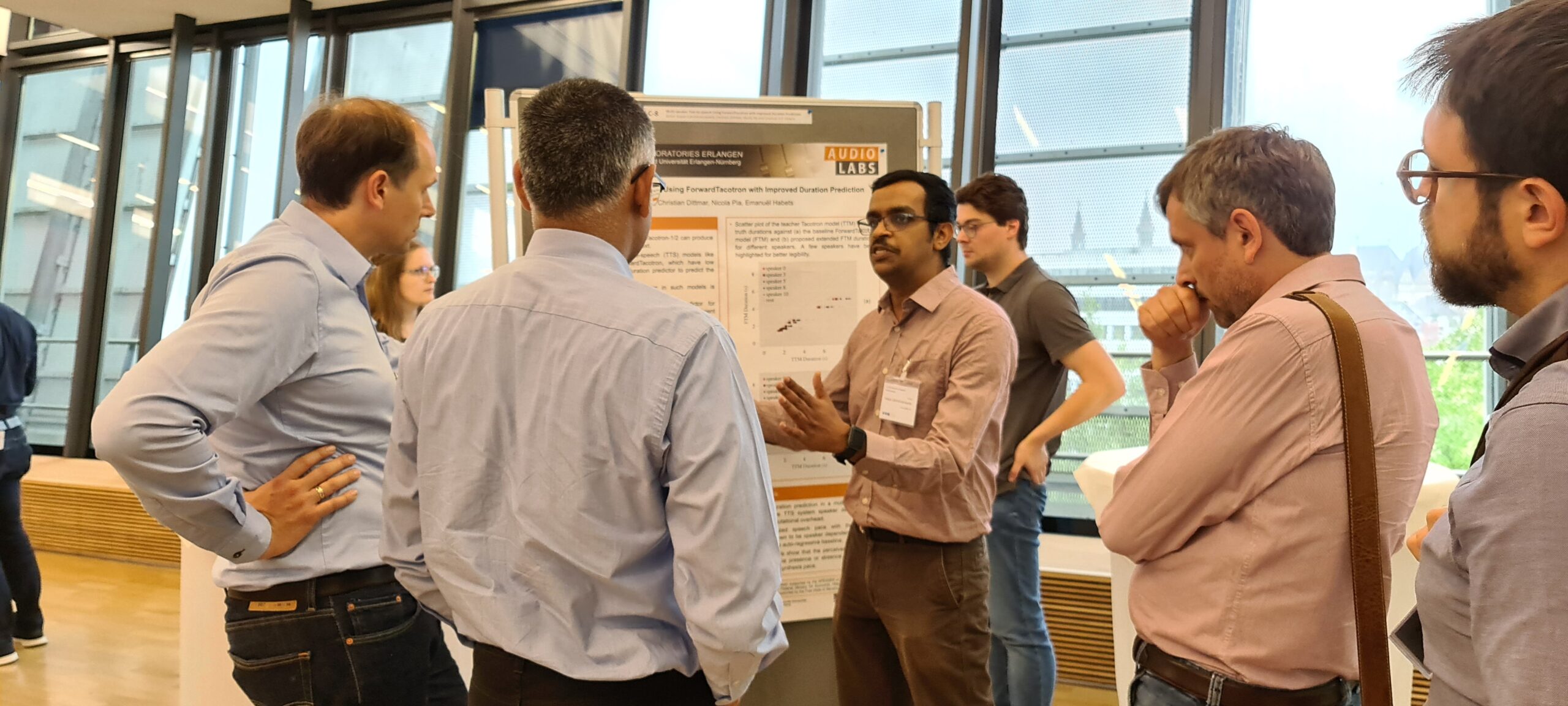
© Katharina Uhlig
The fifteenth symposium in a successful series of events on the topics of speech processing, audio and spoken language processing took place from September 20 to 22, 2023 in the SuperC building of RWTH Aachen University.
Central and in the heart of university life, a lively scientific exchange took place with a focus on theory, algorithms, and application relevance of the topic composition. Conference participants exchanged ideas in workshops and benefited from both professional and personal networking. Alternating blocks of lectures and poster presentations, as well as a show & tell session formed elements of the three-day conference.
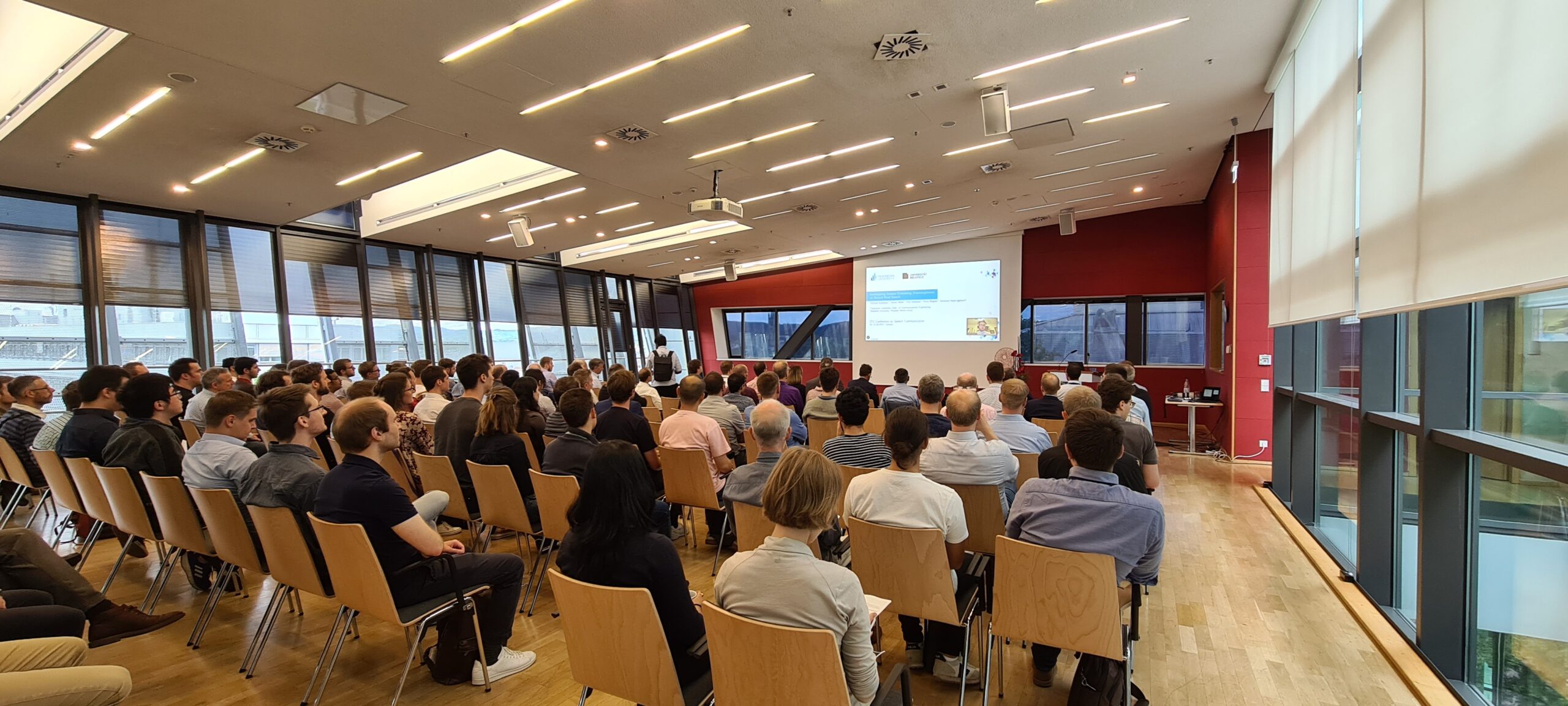
© Katharina Uhlig
Other highlights included three keynote presentations from renowned individuals with expertise:
For Team Viewer, Dr. Hendrik Witt presented real-life use cases for augmented reality solutions for process optimization in the working world and explained the extent to which wearables and sensors are driving the industrial metaverse. The goal, he said, is digitization far from desks, for example in logistics, manufacturing or field service. Team Viewer sees the metaverse as an interface between the real world, the Internet and technology. Its AR platform Frontline offers augemnted reality, mixed reality and artificial intelligence on smart glasses, smartphones, tablets and other wearables. Empowered so-called frontline workers through this could usher in the next industrial revolution.
Professor Nilesh Madhu of Ghent University vividly explored the evolution of communication technology in his talk; from the use of tedious, hand-made, stochastic models to a plethora of impressive state-of-the-art data-driven approaches. His remarks also allowed a glimpse into the future and opened the discussion on whether the knowledge and experiences of the past are suitable to pave the way there.
Focusing on practical experience and the application of research results, Professor Frank Kurth from the Frauenhofer Institute for Communication, Information Processing and Ergonomics presented concrete safety application scenarios that use various approaches, including Deep Learning, for information extraction. Especially with respect to voice communication, the extraction of information from sensor signals is a significant aspect of safety-critical applications. This requires reliable methods, while complying with applicable law. The challenge here is often the poor quality of audio signals combined with the need to process large amounts of data in real time.
In addition to the exciting scientific content shared at the conference, a rich cultural offer was also opened to the participants. The city of Charlemagne showed its best side during the various guided tours and allows many insights into its historical heritage.
The conference was organized by the Informationstechnische Gesellschaft (ITG) in VDE, in cooperation with the Technical Committee Speech Communication AT3, as well as the Technical Program Committee and the Institute for Communication Systems at RWTH Aachen University.
Extensive information can be found on the homepage of the ITG conference.
Biosensors for health: Team AixSense receives multiple awards at Sensus 2023
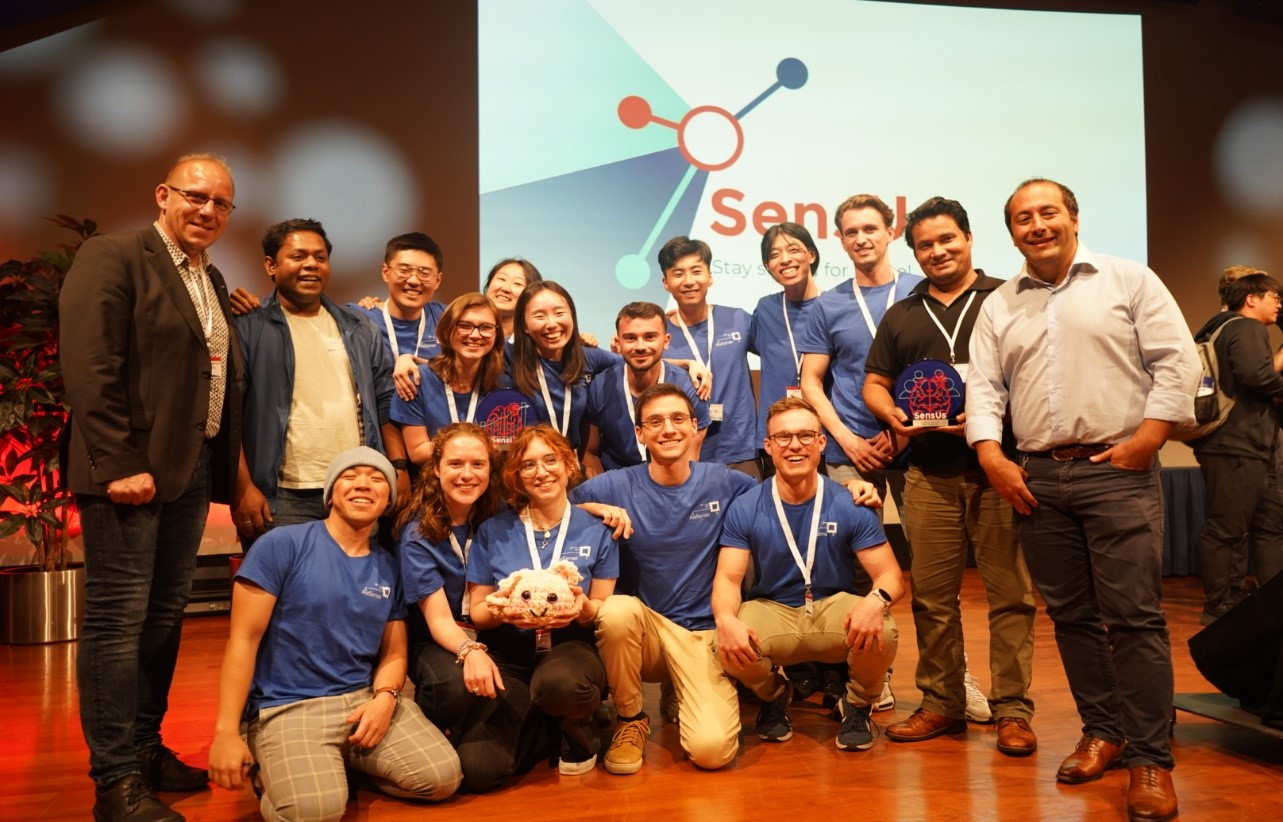
© Erdenebat Battseren
With the development of an innovative blood-based biosensor for the detection of traumatic brain injuries, the AixSense team stood out in an impressive field of competitors.
Once again this year, 15 student teams from all over the world took up the challenge of creating a biomarker prototype for detection and thus advancing sensor technology for improved healthcare.
RWTH Aachen’s AixSense team excelled in the competition, which was hosted by Eindhoven University. Their biosensor chip, which was manufactured with extreme precision in the cleanroom laboratory, caught the attention and recognition of the jury. This led to an award of the coveted Translation Potential prize. In addition, AixSense secured the Public Inspire Award by cleverly using social media platforms and collecting 1000 votes within 24 hours. The Aachen team’s outstanding engagement culminated in a first place in the vlog competition, which earned them the prestigious SensUs Gold Medal.

© SensUs
After the previous topics on antibiotic resistance, rheumatism, epilepsy, influenza A and sepsis, the teams from universities around the world explored a new pathology: Traumatic Brain Injury, defined as sudden external injury resulting in brain damage. Every year, around 27 to 69 million people worldwide are affected by this. The challenge here is the range of injury severity, which makes accurate detection all the more relevant.
„We are honored to have participated in such competition representing the university on an international level. We are also proud that all our team efforts were awarded with several prizes for RWTH Aachen University,”concludes the team leader of AixSense.
The Institute of Materials in Electrical Engineering at RWTH Aachen University deserves special credit for putting together this exceptional team, led by Dr Vivek Pachauri and Professor Sven Ingebrandt, with Dibyendu Khan and Aidin Nikookhesal supervising.
Check out the SensUs page for more up-to-date information on this year’s competition.
IntSpire – the Prize for Internationalization
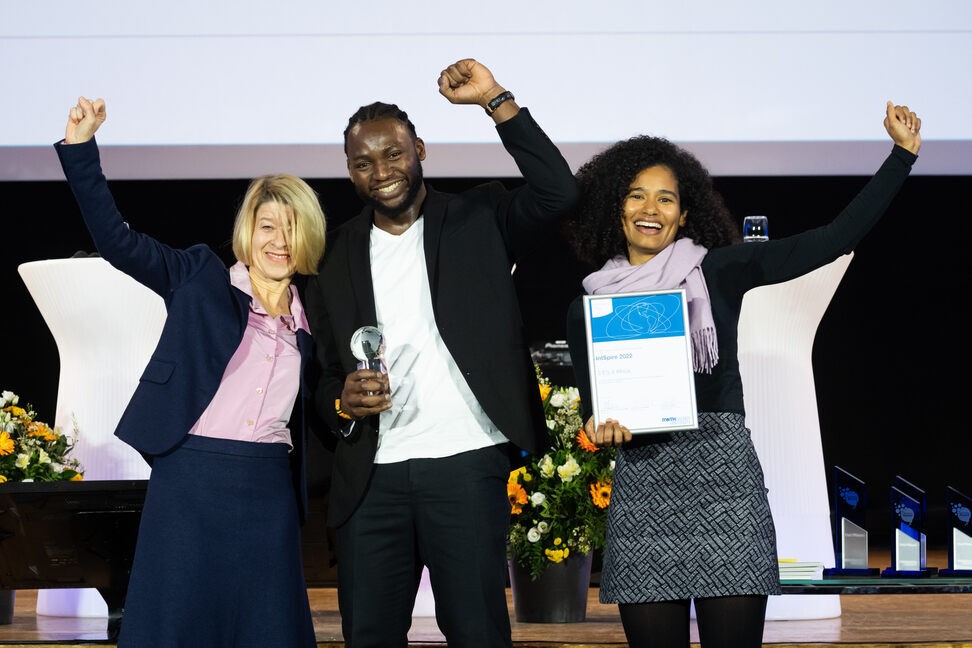
Award ceremony IntSpire 2022 © Heike Lachmann
Creativity, diversity and internationality are the building blocks of excellent solutions to the global challenges of our time.
In order to make visible and honor people and institutions within RWTH Aachen University who make an exceptional contribution to the internationalization of the university, the “IntSpire” prize was established in 2020 by the International Office and the Prorector for International Affairs and has since been awarded annually in a festive setting and with prize money of 500 euros.
Internationalization permeates all levels of our university and changes them in a far-reaching and sustainable way. It opens up the boundaries of our own horizons and is crucial for education, teaching, research and the future of our society.
In order to promote and advance the diverse facets of living internationalization at RWTH, many individuals and institutions are committed beyond the normal scope.
Against this backdrop, the IntSpire team is calling for suggestions for honors from among RWTH members. These can be individuals such as employees and students, but also organizations, facilities and institutes that are particularly committed to the internationalization of RWTH. During the proposal phase from September 1 to October 15, a proposal form can be filled out and submitted by e-mail. A jury consisting of representatives of the university management, the professorate, the International Office, the Staff Council for Technology and Administration, the Staff Council for Scientific Employees and the students of RWTH Aachen University will select an award-winning person or institution from the proposals received and substantiated in writing.
For more information and the proposal form, please visit the official RWTH page.
Writing Workshop E-Technology Winter Semester 2023/24

© Martin Braun
You are studying a bachelor or master subject at the Faculty of Electrical Engineering and Information Technology? The study or final thesis is now imminent? Then get the support of the Language Center and benefit twice!
The semester course in presence strengthens the subject-specific writing and text competence with customized writing advice. Practical workshops based on text examples from electrical engineering and information technology provide know-how on text structure, language, style and citation. The online expert feedback in the writing consultation helps to individually apply what has been learned in the course to the current project or thesis. Voluntary participation in an introductory course on technical subject research at the University Library is also offered as part of the course.
After successful participation, the Language Center awards a certificate and 3 CP, which are creditable according to the respective examination regulations.
International students must prove a German language level of at least C1.2 as a prerequisite for participation in the course.
Registration takes place via the user account at the Language Center.
Registration deadline: September 29 – October 10, 2023
Dates:
| Group 1 02.54478 |
Group 2 02.54479 |
|
Wed, 08.11.2023 Wed, 22.11.2023 Wed, 06.12.2023 Wed, 10.01.2024 each from 09.00 to 12.00 hrs |
Wed, 15.11.2023 Wed, 29.11.2023 Wed, 13.12.2023 Wed, 17.01.2024 each from 09.00 to 12.00 hrs |
Contact for queries: schreibzentrum@sz.rwth-aachen.de
60th Anniversary of the Institute of Hearing Technology and Acoustics
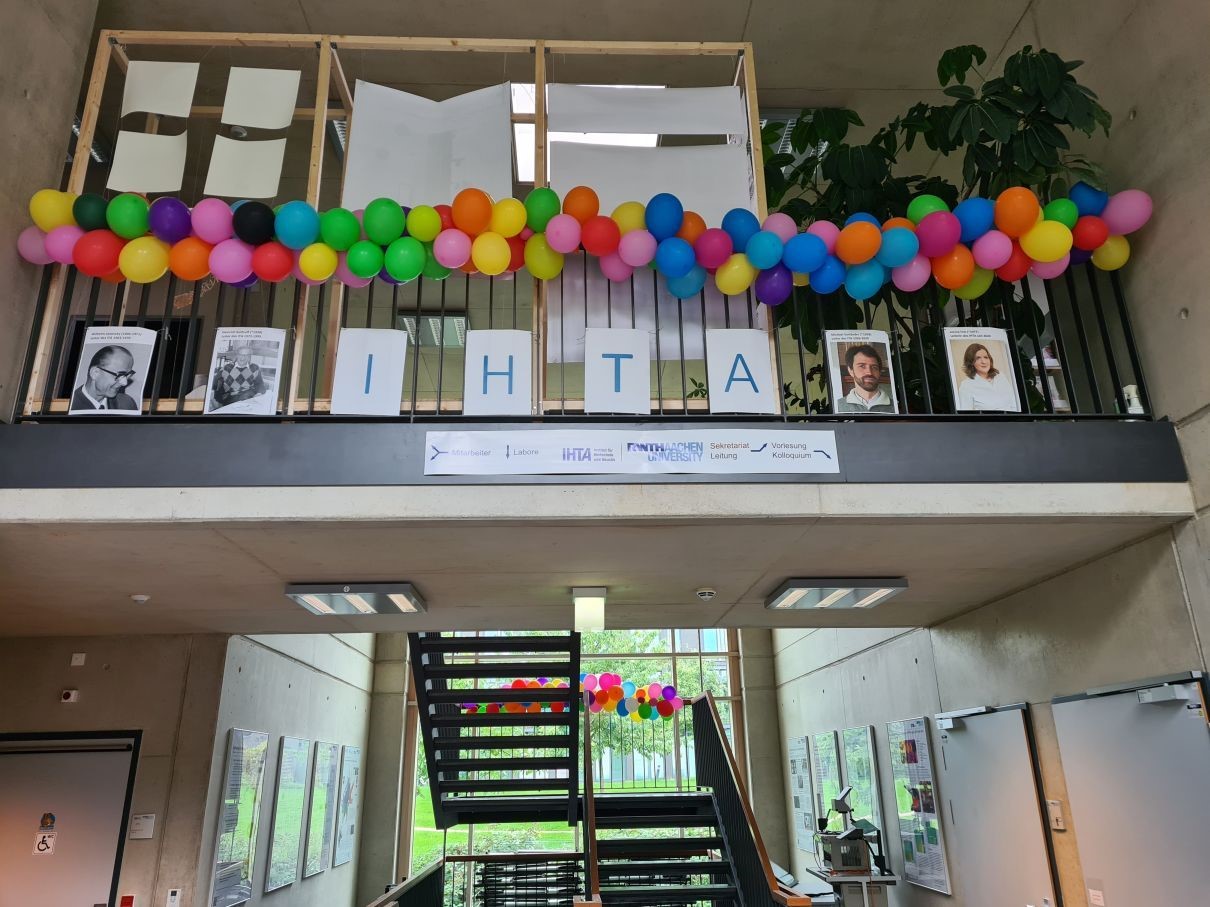
© Institut für Hörtechnik und Akustik
A special day for the Institute of Hearing Technology and Acoustics (IHTA/ITA), was created by all active and former members of the Institute on Saturday, August 19, 2023, when they celebrated its 60th anniversary.
The Institute of Technical Acoustics was officially founded on January 2, 1964 under the leadership of Professor Wilhelm Janovsky and since then has had an impressive history in the research and development of acoustic technologies and hearing techniques. Over the years, outstanding individuals have taken the helm of the Institute, including Professor Heinrich Kuttruff in 1972, Professor Michael Vorländer in 1996, and finally Professor Janina Fels, who has headed the current Institute of Hearing Technology and Acoustics since 2020.
The anniversary celebration drew more than 120 former and active members of the institute who joined in a day full of festivities and activities. The event featured tours of the Institute’s facilities and demonstrations of current research topics highlighting advances and innovations in the field of acoustics and hearing technology. Of course, food, drinks and live music by the IHTA band were not to be missed to round out the festivities.
Special thanks were given to the Association for Technical Acoustics (GfTA), which contributed significantly to the organization and realization of this anniversary celebration. The GfTA is an association that focuses on the promotion of acoustics in Aachen, especially with regard to young talent. It made it possible that the event became an unforgettable event and supports and strengthens the community of the former and active members as well as the new generation in the field of acoustics.
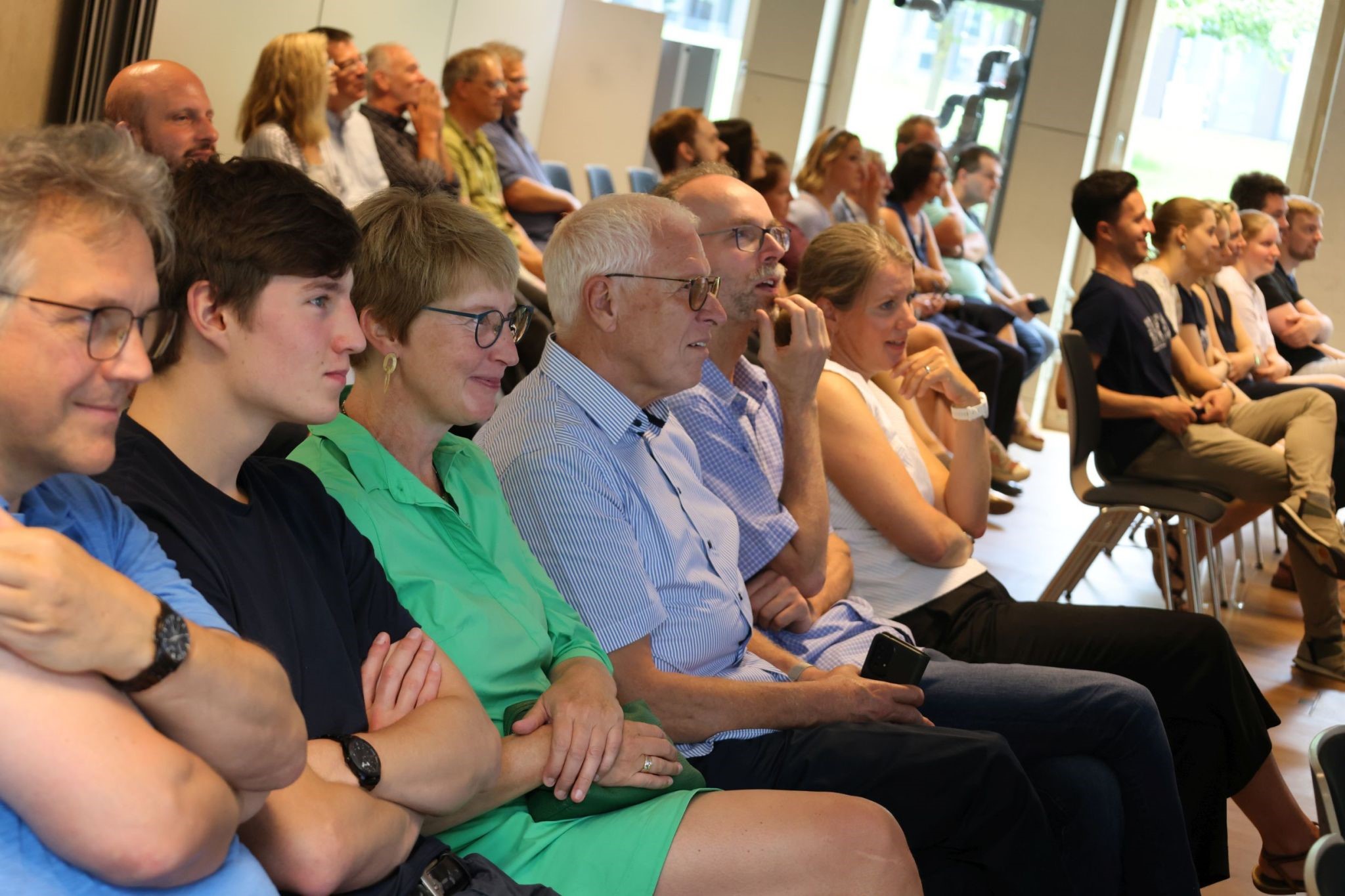
© Institut für Hörtechnik und Akustik
For more on the anniversary celebration, visit the Acoustics Blog. Their goals as well as further information about the Association for Technical Acoustics and all current news and research projects of the Institute of Hearing Technology and Acousticsare available.
First AUDICTIVE Conference 2023
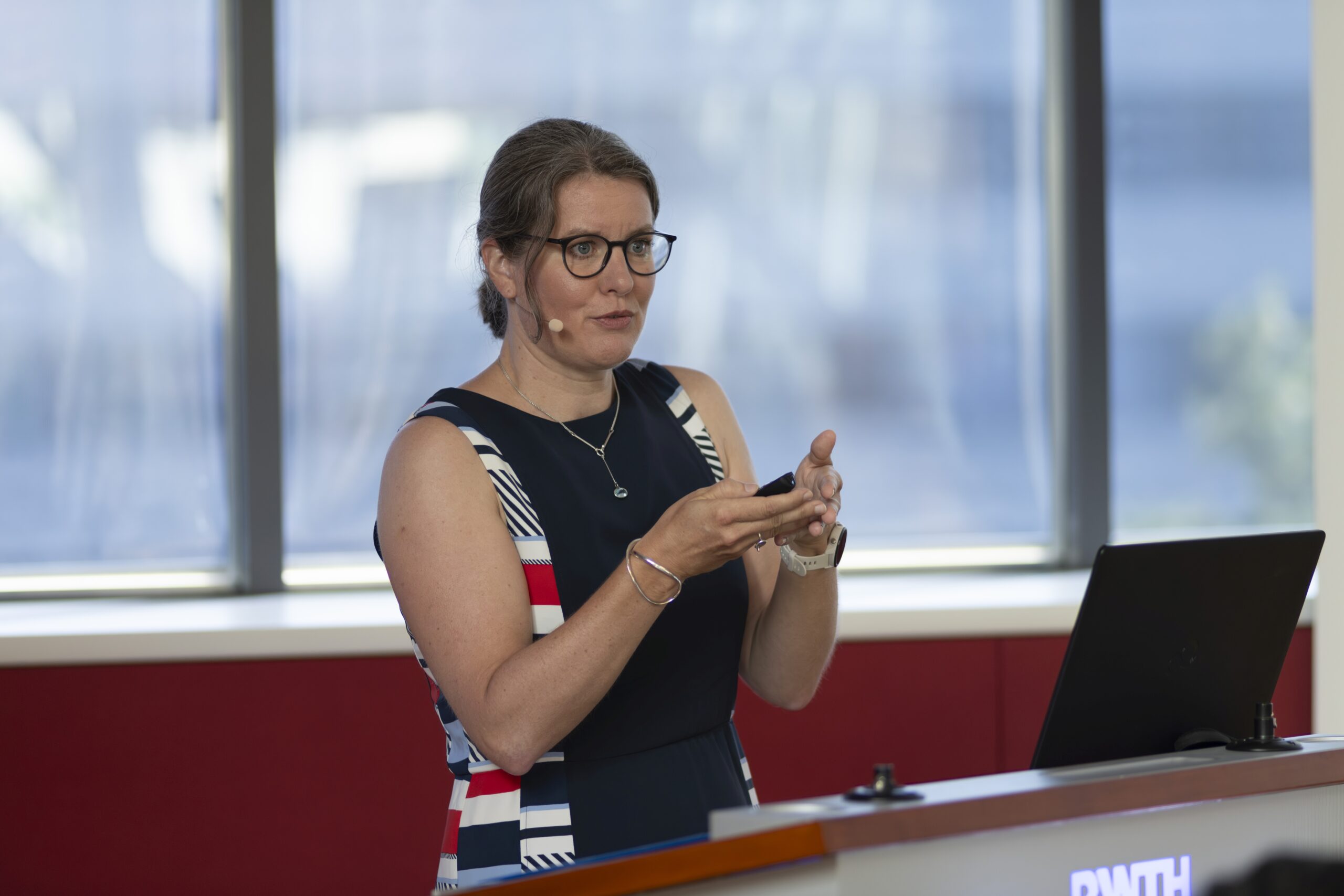
Professorin Janina Fels © Gottfried Behler, Janina Fels und Alexander Raake
A conference like a booster shot for the dynamics of basic research aiming to bridge the gap between auditory perception and cognition on the one hand and virtual reality on the other.
With recent developments in hardware and software technologies, audiovisual virtual reality (VR) has reached a high level of perceptual plausibility, which allows to overcome the limitations of simple laboratory situations. This creates good conditions to explore in a controlled way the ability to interact with a complex audiovisual scene – as a representation of an authentic life experience, for example, in a classroom, an open-plan office, or else as complex outdoor communication situations – depending on acoustic, visual, and other contextual factors. The applicability of the resulting scientific results in the immediate living environment, as well as their feedback for quality enhancement in interactive audiovisual virtual environments and quality assessment methods of the interface of the two disciplines are topics of the conference and the subject of research.
In response to these multidisciplinary challenges, university professor Janina Fels from the Chair of Hearing Technology and Acoustics at RWTH Aachen University invited researchers from the fields of acoustics, cognitive psychology and computer science to the first AUDICTIVE Conference from June 19 to 22, 2023. The goal here was to ensure interdisciplinary collaboration in basic research and to make possible synergy effects that cannot be achieved by a single discipline.
Currently, research efforts are mostly conducted separately within individual scientific research communities. This prevents cognitive psychology and acoustics from fully exploiting the enormous potential of VR to test and extend their existing theories in the more realistic, rich, and interactive virtual environments that can be created with the current state of the art in VR technology. At the same time, VR research can benefit from the knowledge of auditory perception and cognition to understand the important quality criteria that must be met to optimize user perception and cognitive performance, as well as subjective experience and (social) presence in a virtual environment. Due to the added value of the collaboration and research methods of the three disciplines, it is expected that research in the areas of hearing, auditory cognition, and VR can be elevated to a much higher level.
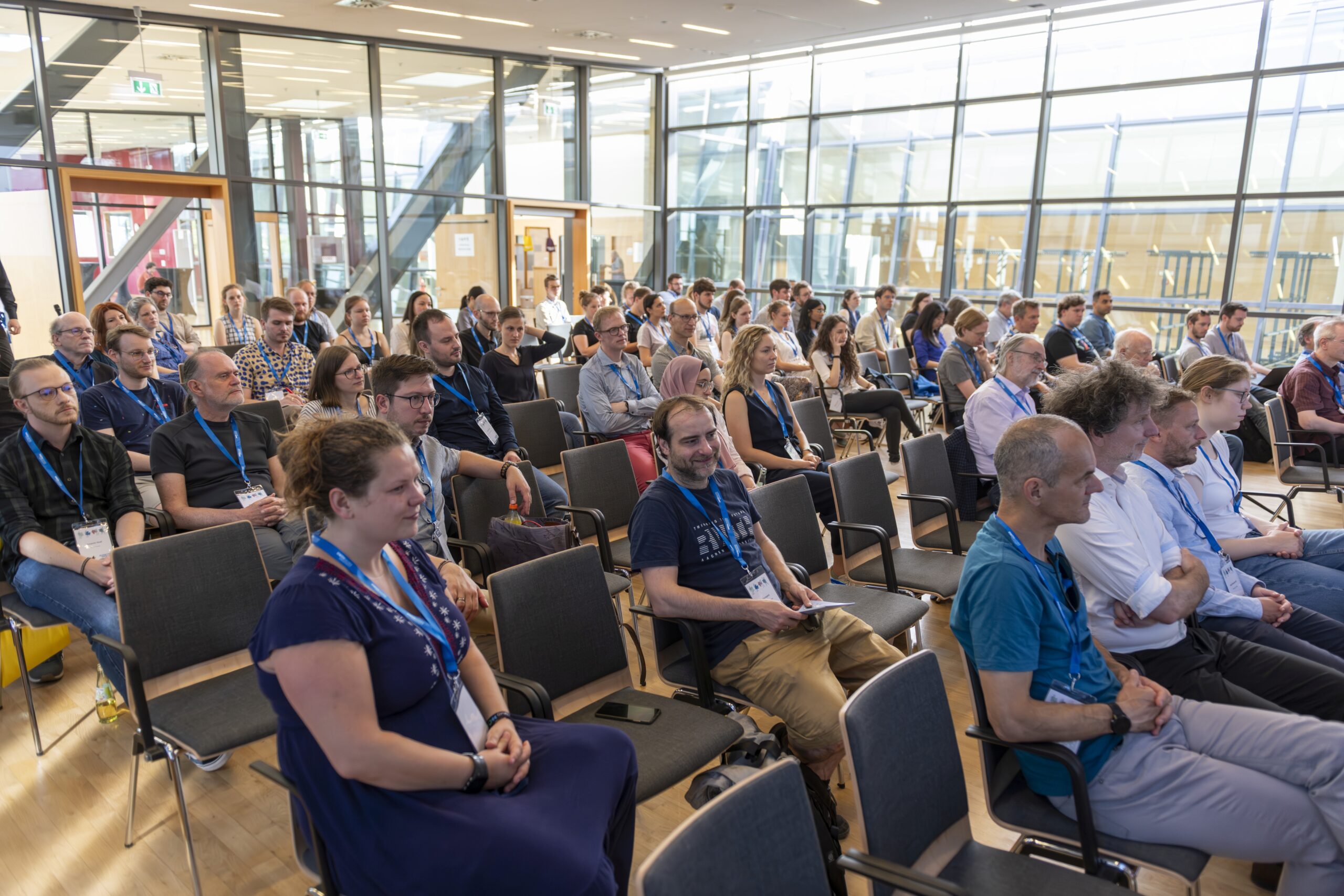
© Gottfried Behler, Janina Fels und Alexander Raake
The conference presentations offered fascinating insights into the future of human-computer interaction, auditory perception and virtual reality:
Professor Barbara Shinn-Cunningham of the Carnegie Mellon Institute elaborated in her presentation on how our brains perceive and evaluate the auditory world around us. It does this by using the interaction between voluntary top-down attention and involuntary bottom-up attention to focus on a speaker while processing new sound sources in our environment. In this talk, Professor Shinn-Cunningham explored how peripheral and central factors combine to determine communicative success, which is influenced by expected and unexpected sounds in everyday environments. She focused on the cortical networks that mediate competition for attention.
In his talk, Professor Frank Steinicke from the University of Hamburg presented the exciting development of the fusion of augmented reality (XR) and artificial intelligence (AI). He emphasized how these technologies enable seamless transitions between real and virtual worlds and have the potential to create immersive experiences.
Still, today’s immersive technology is decades away from the ultimate representation. However, the shortcomings of the human perceptual system, cognition, and motor skills can be exploited to bend reality to enable compelling immersive experiences. His talk presented several XR illusions that bring us closer to the ultimate fusion of intelligence and reality.
Professor Alexandra Bendixen from TU Chemnitz spoke about her research in auditory perception and sensing. She explained how she creates scenes with multiple interpretations and monitors listeners’ perception to investigate factors that stabilize auditory perception in ambiguous scenes. Recent combinations of auditory multistability with eye tracking have provided new insights into the interplay between auditory and visual multistability, with implications for our general understanding of scene analysis across all senses. When psychophysiological measurement logic is flipped, brain responses associated with sensory predictions can be used to evaluate certain aspects of virtual reality (VR), such as the appropriateness of VR latencies.
More information about the AUDICTIVE Conference is available on the official website.



